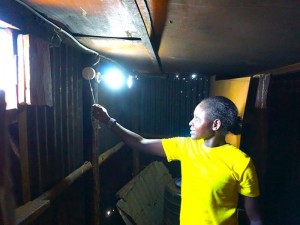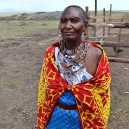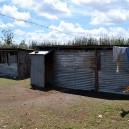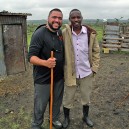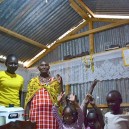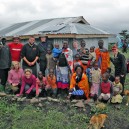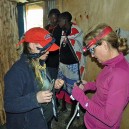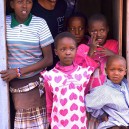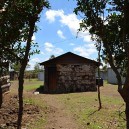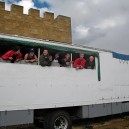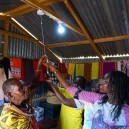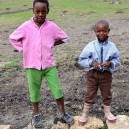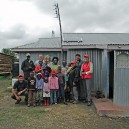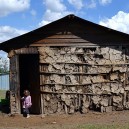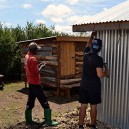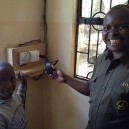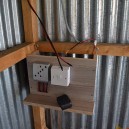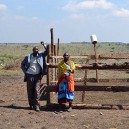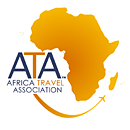Before talking about how solar power empowers poor rural communities in Africa it is important to understand the connection between mobile phones and empowerment. Throughout most of the Western World mobile phones are an expensive luxury; however throughout most of Africa mobile phones are inexpensive and call/internet charges are minimal taking the usage of mobile phones to new heights.
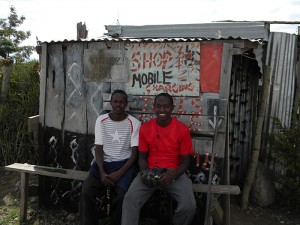
Throughout most of rural East Africa people cannot afford electricity and have to walk many miles to charge their mobile phones
Mobile phone revolution
In most developing countries the infrastructure for land phone lines simply does not exist. The mobile phone has taken the place of traditional land lines. Network coverage is available across most of the region and where there is mobile phone coverage there is also internet access.
Mobile phones are affordable and functional – a subscriber is given the choice of prepay (scratch cards) or post pay. On average a second hand phone with internet access sells for as little as USD$15. Local phone calls cost as little as USD$0.03 (3 cents) per minute, a 4mb bundle of internet costs as little as USD$0.05 (5 cents). All mobile phone providers have systems called “flashbacks” enabling a subscriber to send a SMS for free saying “please call me” up to 5 times each day. Additionally mobile phone providers enable phone credit for pre pay users to be purchased in advance with a few days grace to repay.
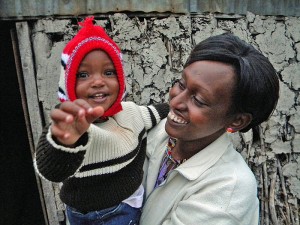
This little guy’s future is looking so much brighter thanks to supporters of Napenda Solar Community
Mobile phone and data services are affordable and the reason 30 million Kenyans are connected to the mobile phone network and 16 million are connected to the internet. Considering Kenya’s population is 40 million, these figures are astounding!
What stands between rural communities taking full advantage of the mobile phone and internet networks is the ability to charge their phones.
Mpesa
Mpesa is an Internationally award winning secure mobile money transfer system invented in Kenya in 2007 to enable easy cash flow using the mobile phone network . One only needs a mobile phone and sign up for an Mpesa account with one of the mobile phone operators to use the system without the need for a bank account. By placing money on the account, this is easily done at any small shop all over the country (there are over 80,000 outlets) or by linking your Mpesa account to your bank account, money can be instantly transferred from one person to another whenever the need arises.
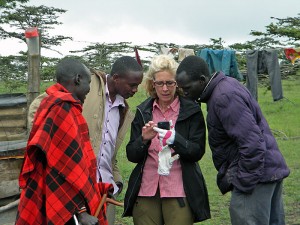
Mobile phones are the only form of communication and are a lifeline throughout most of rural East Africa. Solar power is the only viable long term sustainable solution.
Mpesa can be used to pay bills, school fees, shop at local markets, buy fuel, pay wages basically anything as well as purchase airtime, transfer money to anyone; depositing and withdrawing money, Mpesa can be linked to a bank account to make deposits and withdrawals.
Mobile money transfer systems have evolved over the years and now has a subscription base of over 22 million users. Mpesa enables everyday Kenyans to embrace a cashless society with minimal fees through their mobile phone dramatically changing Kenyan daily life, empowering women and spurring economic development. Mpesa enables money transfers to be conducted anywhere and at any time reducing the need to travel long distances, spend hours in queues paying bills and the need to carry cash.
The mobile phone revolution and Mpesa are integral to empowering poor rural communities. These infrastructures exist however what is missing is access to electricity to charge mobile phones in order to take advantage of these and other services.
Empowering poor rural communities
Solar power is a vital step to empowering poor rural communities.
Productive hours
Simply by having a few lights and mobile phone charging points increases the amount of productive hours per day. The sun rises and 6:30am and sets at 6:30pm, so currently, once the sun sets, the day stops.
Further, with access to mobile phone charging, households can pay bills or transfer money via the award winning Mpesa; can access real time market rates for livestock and produce without having to travel long distances; broker deals for produce and livestock without a middle man or at the very least have information about market prices and therefore being able to negotiate better prices for produce hence increasing profits; access Apps on weather, information on planting times, expected rainfall – basically can conduct all levels of business over the mobile phone network without having to spend time and money travelling long distances.
Not only are productive hours increased but access to information empowers poor rural communities.
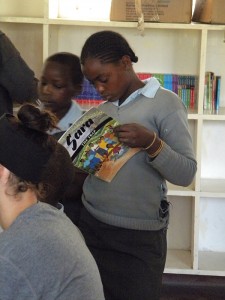
Education is so important in East Africa, these school children now enjoy solar power in their rural homes thanks to Napenda Solar Community
Children study and education
Access to information and education is a proven means out of the poverty cycle. Currently by the time children have completed household chores and eaten dinner it is after 6:30pm and dark. With good lighting children can study in a clean healthy environment.
School children can research school assignments, join mobile study groups without having to travel long distances, utilise apps to further develop skills in areas such as Math and English; access online encyclopaedias; keep updated on local and international news; access online educational resources like readers and spelling tools to enhance and further develop skills.
Solar power offers children in poor rural communities the same opportunity to accessing information as children in wealthier urban areas; potentially levelling out the playing field. Currently the pass rate for primary school children in Kajiado County is a mere 17%.
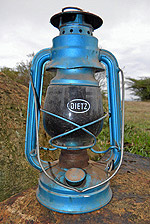
Kerosene lanterns are all poor rural families in East Africa can afford for lighting, these lanterns cause numerous respiratory and eye problems
Health
If a family can afford it they use kerosene lanterns, kerosene is expensive and omits toxic fumes, causes eye strain through poor quality lighting and contributes to 70% of household fires and 80% of burns injuries in young children in Africa.
Swapping expensive kerosene lanterns for solar power not only saves the household money but also their health.
Access to emergency health care services and information
Studies throughout East Africa have shown a strong connection between mobile phones and accessing health care services. In rural areas, where health care services is very limited, communities are able to phone health care services in cases of emergencies and complications during child birth resulting in a reduction in general and maternal mortality rates. Communities are accessing local area nurses for health information via the mobile phone; similarly community health nurses are able to communicate health related messages to communities.
Crime prevention
Solar power lights up the house, making the household safer and more secure. Further should one household have a problem they can easily alert their neighbours, community leaders or police for assistance either through phoning or if there is no phone credit utilising the free “flashback” system.
Neighbourhood watch is very much alive and well throughout most of rural Kenya through informal yet effective structures. Mobile phone communication brings communities closer together enabling safety and security issues to be addressed again empowering poor rural communities in Africa.
For more information email solar@africaexpeditionsupport.com

